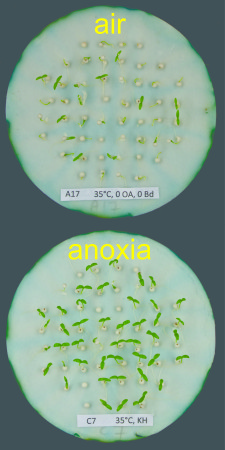The potential benefits of recent developments in DNA sequencing technologies to both collection management and use will also be explored during the course of the project.
That was from an article a couple of days ago on the future of the UK’s vegetables genebank. Well, we learned yesterday that for rice, at least, that brave new world is almost at hand:
…access to 3,000 genomes of rice sequence data will tremendously accelerate the ability of breeding programs to overcome key hurdles mankind faces in the near future.
That would be DNA sequences from 2,466 of the International Rice Genebank Collection’s (IRRI) accessions, plus 534 accessions housed at the CAAS genebank, amounting to 13.4 terabytes of data. This begins the long road to sequencing the whole IRRI collection of about 100,000 accessions, the rationale for which was recently set out:
In this paper, we will discuss how genotyping and sequencing can be integrated into the activities of a modern gene bank to revolutionize the way scientists document the genetic identity of their accessions; track seed lots, varieties, and alleles; identify duplicates; and rationalize active collections, and how the availability of genomics data are likely to motivate innovative collaborations with the larger research and breeding communities to engage in systematic and rigorous phenotyping and multilocation evaluation of the genetic resources in gene banks around the world. The objective is to understand and eventually predict how variation at the DNA level helps determine the phenotypic potential of an individual or population. Leadership and vision are needed to coordinate the characterization of collections and to integrate genotypic and phenotypic information in ways that will illuminate the value of these resources. Genotyping of collections represents a powerful starting point that will enable gene banks to become more effective as stewards of crop biodiversity.
Alas, the news came a few days too late for the Pahiyas Festival:
Clearly, rice is the main inspiration of this delightful affair. The rice grains, rice plants and rice seedlings on display may all seem the same, but a closer look will reveal that they are not. Some seeds are longer, some are rounder and some are lighter in color than others, reminding us of just how rich and diverse our rice varieties are.
Maybe next year.
Meanwhile, if you want to celebrate instead by cracking open a nice bottle of wine from the Quinta do Crasto estate in Portugal, well, they’re using high-resolution genotyping there as well to figure out just exactly what clones they have in their fields. What’s that you say? You don’t drink wine? How about a nice bar of quality heirloom chocolate, also thoroughly genotyped, then? Truly the future is upon us.
